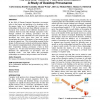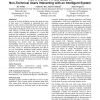306 search results - page 6 / 62 » How knowledge workers use the web |
CHI
2010
ACM
14 years 2 months ago
2010
ACM
Knowledge workers expend considerable effort managing fragmentation, characterized by constant switching among digital artifacts, when executing work activities. Activitycentric c...
CHI
2010
ACM
13 years 5 months ago
2010
ACM
In the field of Human-Computer Interaction, provenance refers to the history and genealogy of a document or file. Provenance helps us to understand the evolution and relationships...
EMNLP
2009
13 years 5 months ago
2009
In this paper, we address the task of crosslingual semantic relatedness. We introduce a method that relies on the information extracted from Wikipedia, by exploiting the interlang...
CHI
2007
ACM
14 years 8 months ago
2007
ACM
In order to develop intelligent systems that attain the trust of their users, it is important to understand how users perceive such systems and develop those perceptions over time...
SEMCO
2008
IEEE
14 years 2 months ago
2008
IEEE
Current Semantic Web reasoning systems do not scale to the requirements of their hottest applications, such as analyzing data from millions of mobile devices, dealing with terabyt...


